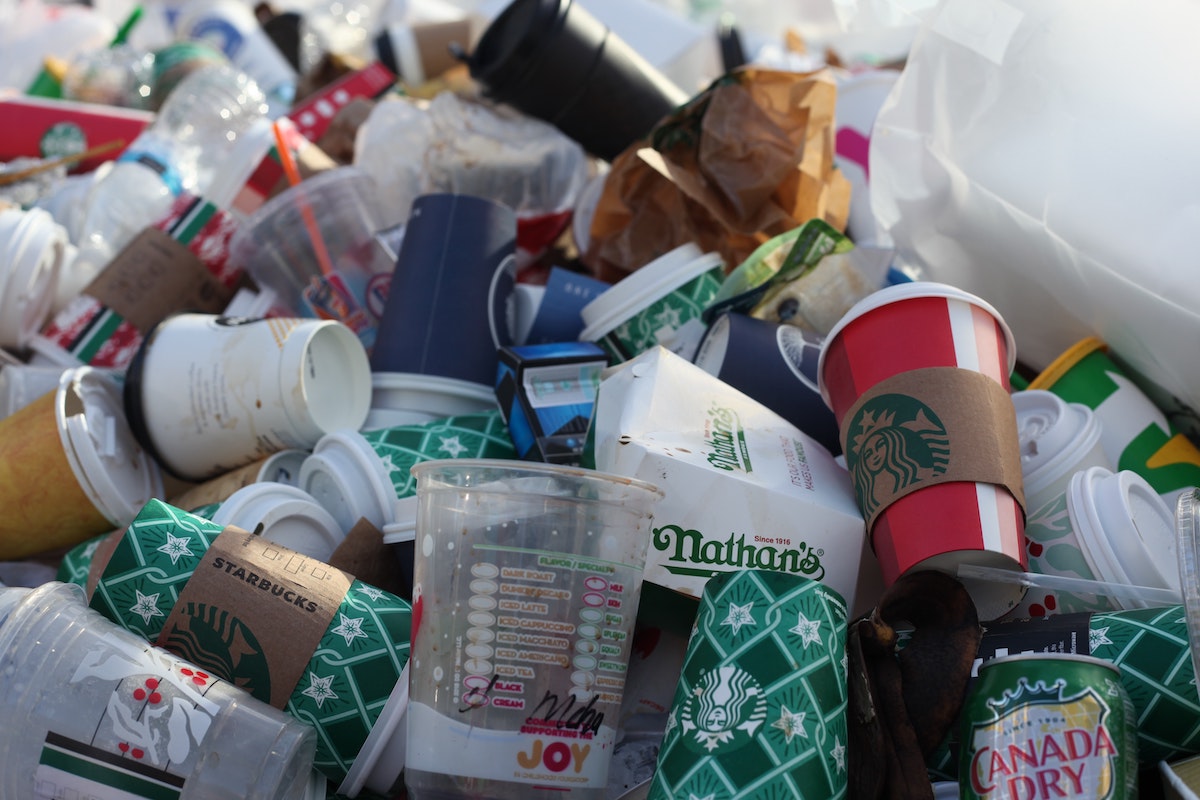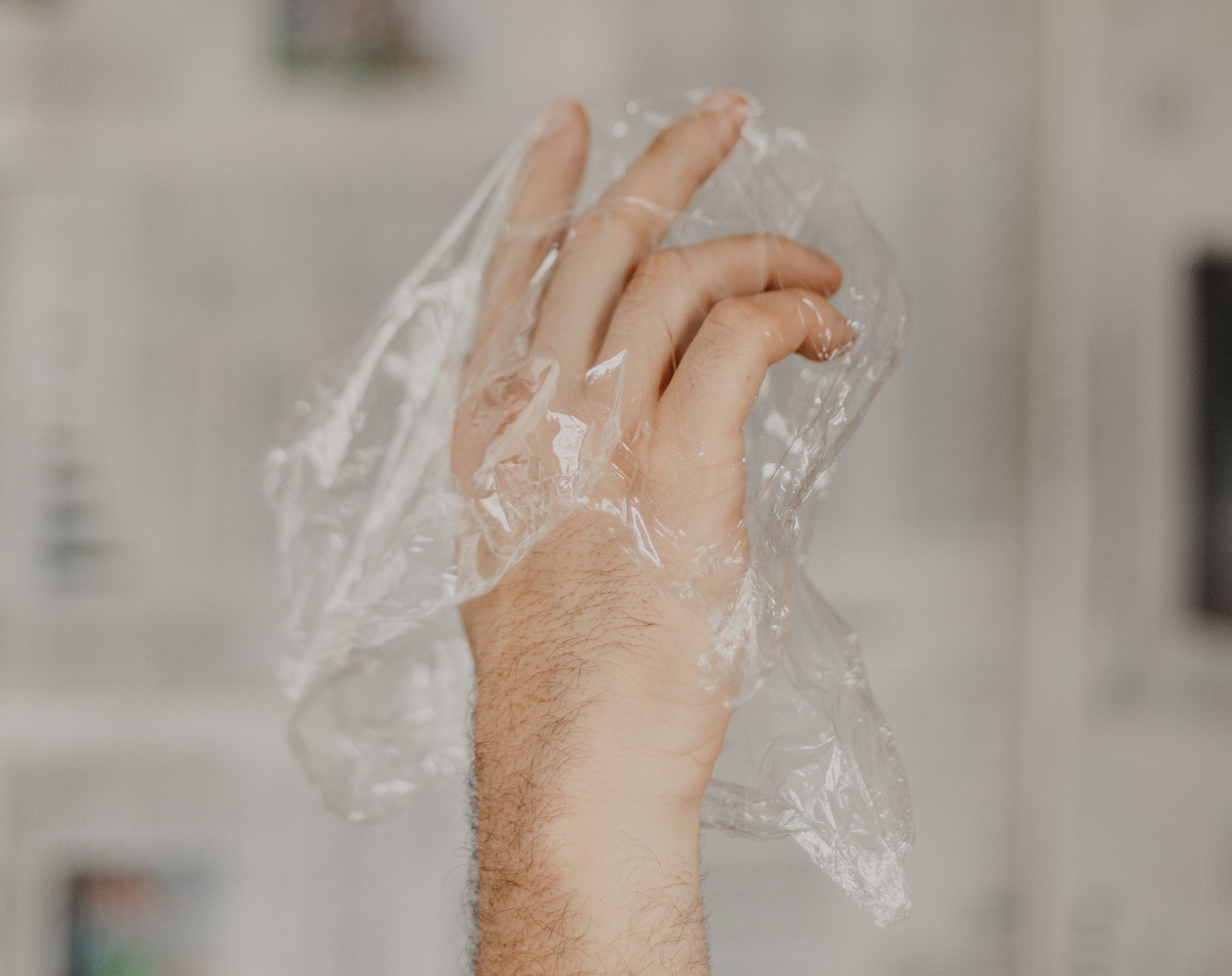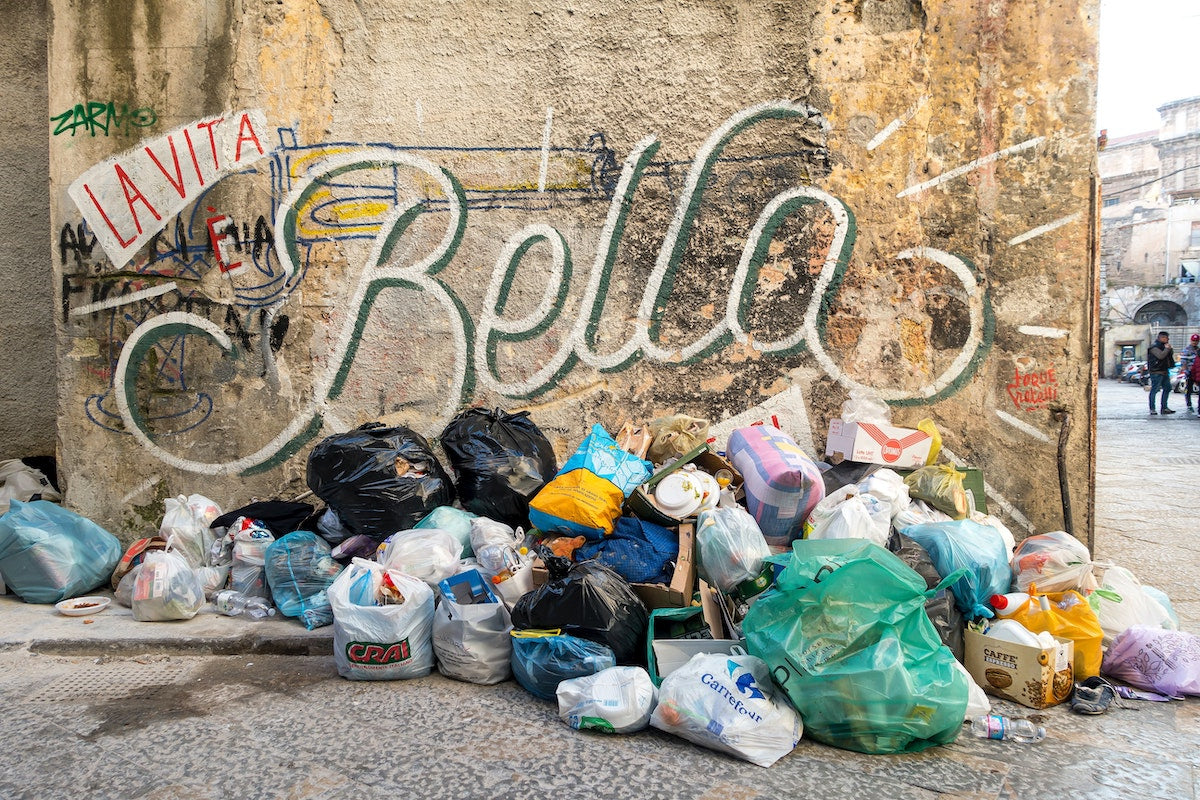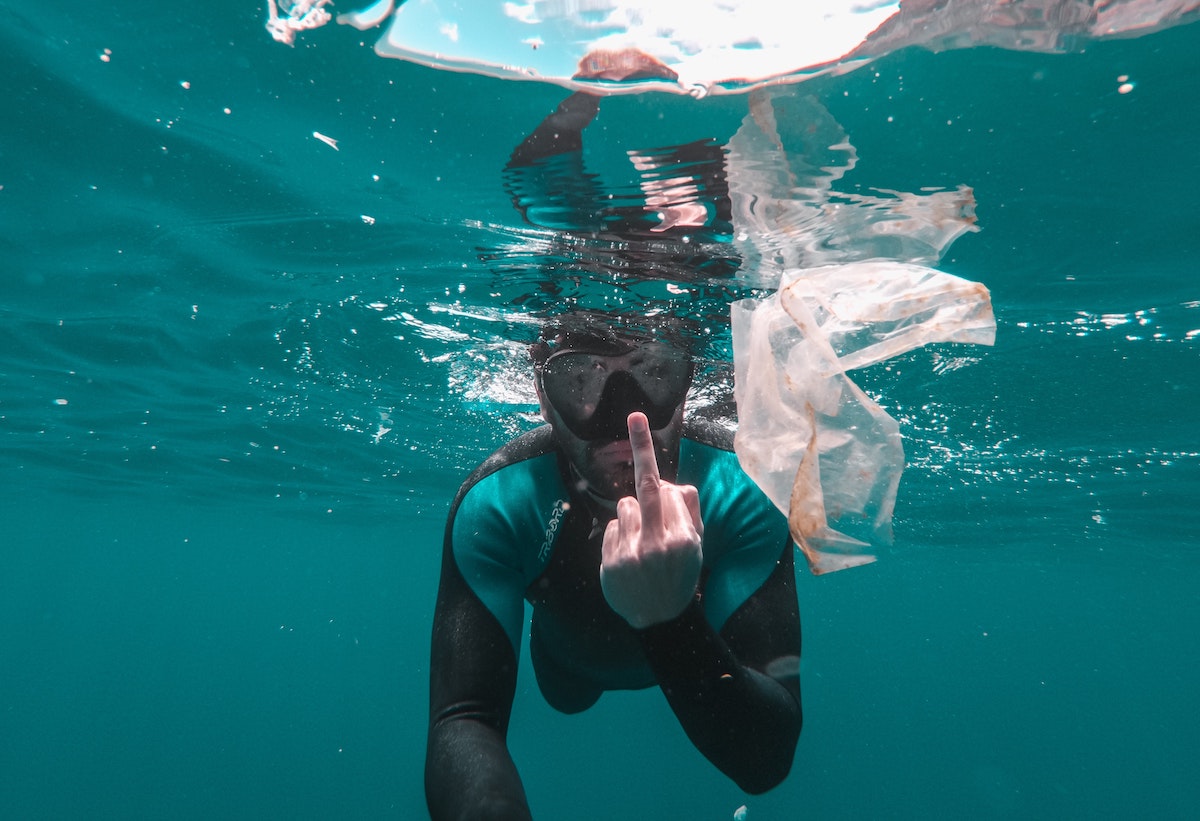30+ Easy Ways to Reduce Your Waste

Written by Sabrina Wu
If you are reading this, chances are you’ve produced a fair amount of waste in your life. According to the Environmental Protection Agency, the amount of waste an average person in the United States produces is 4.4 pounds a day, which is over 1600 pounds of trash a year. That’s as heavy as a whole cow, in garbage, per person every year. If there are 328 million people in the United States, then that’s 328 million cows, and we definitely don’t have enough fields for them all.
Waste production is one of those issues that everyone knows about, but is often filed away for “someone else to fix.” The problem with that mentality is that the solution to waste production isn’t found on an individual, corporate, or even government level. In fact, the solution to waste production is found through collective effort, where everyone plays a part.
In this article we'll go over:
- What Does it Really Mean to Reduce Your Waste?
- Why is Waste Reduction Important?
- How Can I Reduce Waste at Home?
- How Can I Get Away From Single-Use Plastics?
- How Can I Reduce Waste at School?
- How Can I Share Waste Reduction Ideas With Friends in a Non-Pushy Way?
- What are Some Tips For Communities to Reduce Their Waste?
- What are Some of the Best Waste-Reduction Products?
- How Will Reducing My Waste Have an Impact on the Environment?
What Does it Really Mean to Reduce Your Waste?
For many of us, we have grown up in a consumerist society with the mentality of excess. If we need something, we buy it. If something breaks, we get a new one. Many of us have been conditioned to participate in this waste lifestyle. That’s why it’s important to understand that reducing waste involves changing lifestyle habits that have played a large role in our lives. At the same time, it doesn’t mean you have to become a monk and renounce all worldly possessions. In fact, reducing waste is going to be different for everyone.
Reducing waste simply means to evaluate the things in your life that you truly value and learn to let go of the things that you don’t need, that don’t serve your purpose, and do not serve the planet.

Why is Waste-Reduction Important?
Most of the garbage that we produce is buried or burned. The rest can be found on street corners and highway ditches. For the most part, waste stream systems practice an “out of sight, out of mind” method, which almost works. Except it doesn’t.
While we can’t necessarily see the damage, it most certainly is there.
When water from precipitation seeps through buried trash in landfills, it creates a sort of garbage juice, called leachate. The leachate then seeps further into the ground and contaminates the groundwater system surrounding the landfill. This is detrimental to those who may be using that water as drinking water. It also has negative effects on the surrounding soil composition and soil microbiome, causing a domino effect on the entire ecosystem. Landfills also produce significant amounts of methane emissions, a strong greenhouse gas which contributes to global warming.
The alternative to landfills is incineration. The problem with this is that burning waste releases toxic chemicals into the atmosphere, which can lead to respiratory issues and cancer. What’s worse is that once the waste is burned, the remaining toxic ash is then dumped in a landfill.
As you can see, and with the global waste production expected to increase in the coming years, the current options for management are not sustainable or viable. Yes, there are smart people innovating new solutions (like garbage-eating bacteria), but as of right now, there is a waste problem, and the simplest way to stop a problem is to remove the cause of it – hence, waste reduction.

How Can I Reduce Waste at Home?
Reducing plastic waste at home
Plastic is one of the largest sources of waste at home. The problem with plastic is that it’s not biodegradable, only some of it is recyclable, and there is just so much of it everywhere. Almost everything has plastic in, on, or around it. 40% of the plastic produced in the world is packaging. Even our veggies are wrapped in plastic. In a world so completely surrounded by plastic, the key to reducing plastic waste at home begins with not bringing it home in the first place.
Here are a few tips on how you can avoid bringing plastic home:
- Say NO to single use plastics. Instead: Bring your own reusable cloth bags, travel mug, water bottle, and food containers to stores (more on this later)
- Think twice before purchasing – only purchase things that you really need, and if possible, pick options that are recyclable (glass, aluminum, paper). For example, opt for barred soap, shampoo, and conditioner instead of bottles.
- Recycle where possible – Keep in mind, not everything is recyclable, and make sure you wash your jars and containers before putting them in recycling bins. If not washed, these items are considered “contaminated” and can not be processed as recycling. Instead, they will end up in the landfill or be incinerated
- Reuse and repurpose. There are many things that you can purchase second-hand at thrift stores or even on craigslist. Reusing items can save you money and has a smaller environmental impact than buying something new (it requires 2700 litres of water to make a single t-shirt)
- Create. Instead of buying something new, there are tons of DIY videos and articles that can show you how to make your own cleaning products, soap, makeup products, etc from regular household products
Reducing water waste at home
Although water is a renewable resource, only 1% of the Earth’s water is considered an accessible source for humans to use. With demands of water consumption rising, this precious resource is only becoming more and more scarce.
There are many things that you can do at home to reduce your water waste:
- Avoid baths and take shorter showers. Leave a couple buckets of water in the shower while you are waiting for the water to heat up and reuse that water for other uses, like watering your plants. You can also install a water-efficient shower head to help minimize water waste
- Choose drought-resistant, low-maintenance plants for your yard instead of water-loving ones to minimize the need to water them as often
- Collect rain water using barrels or chains. You can reuse this water in the future to wash your car or water your lawn. You can also get a filter system to convert collected rain water into drinking water
- Make sure you have a full load of laundry before using the washing machine.
- Turn off the tap while brushing your teeth
It’s important to note that water waste also includes everything that washes down the drain, including soaps and cleaners. While grey water systems aim to separate themselves from natural water systems, during large storms, grey water can overflow into lakes and streams, contaminating our natural courses with chemicals and detergents. For this reason, it’s ideal to keep your soaps and cleaners natural and/or biodegradable.
Reducing food waste at home
Reducing food waste at home starts at the grocery store. When shopping for groceries, only purchase as much as you will eat. Waste not, want not. When storing groceries at home, put them in visible spots that are easy to see. This prevents you from forgetting certain food items and having them spoil and waste away.
If you have purchased only what you need, theoretically the only food waste that you should be producing are food scraps. There are two ways to handle food scraps. You can either reuse them in soups, broths, or sauces, or you can compost them. Veggies, fruits, egg shells, starches, and other food items are all compostable, as well as toilet paper and paper towels. Just make sure that the paper towels and toilet paper are not filled with grease or other chemicals.
Composting can be as easy or complex as you wish. For me, I opt for the easiest option. I place a compost bin beside my kitchen sink where I can easily dump my food scraps. Then, every week my municipality comes by in their big truck and they take everything away. It’s great. Just make sure to line compost bins with a municipality-approved compostable bag.
For those who do not have the option of having their compost picked up, you can make your own compost. There are resources online that show you detailed explanations on how you can create your own compost in your backyard, or even in tote containers that you can store in your closet (spoiler alert: worms). The benefit to this option is that you can use your freshly made compost in your own garden for free.

How do I Get Away From Single-Use Plastics?
The most important word to use when trying to get away from single-use plastics is…
N-O. No.
Since single-use plastics are very convenient and used almost everywhere, getting away from them involves a fair bit of refusing.
To get away from single-use plastics, here are some things you’ll want to refuse or stop using:
- Refuse plastic bags. Instead: Bring your own totes and cloth produce bags when shopping
- Refuse coffee cups. While they look like paper, the lids are plastic, and a lot of them are lined with plastic. Which means? You guessed it, they aren’t recyclable. Instead: Bring a reusable coffee tumbler to the coffee shop to fill up or save some money and make your own coffee at home
- Refuse plastic straws. Instead: Drink from the glass or bring your own reusable straw. Note: While some servers might ask if you want a straw, not all will. You may have to explicitly tell the server that you don’t want a straw. Eventually, this will just become second nature when you order.
- Refuse takeout containers and plastic cutlery. Instead: Bring your own reusable containers and cutlery, and ask the server or food attendant if they can pack your food in your containers instead
- Refuse plastic water bottles. Instead: Use a reusable water bottle
- Do not use Ziploc sandwich bags and plastic wrap. Instead: Use reusable containers, beeswax wraps, or biodegradable and reusable sandwich bags to store food
- Switch from regular garbage bags to compostable or biodegradable garbage bags
- Switch from using laundry detergent in a big plastic bottle to eco laundry strips
- For people who menstruate, rather than tampons and pads, opt for reusable menstruation products such as a menstrual cup, period-proof underwear, reusable pads, or, if you’re already on birth control, an IUD.
- Refuse plastic packaging. Shop at farmers markets. Compared to the grocery store, products at farmers markets are less likely to have packaging waste. Also, bring your own mason jars and containers to bulk stores. You’ll get a better price, and you won’t need to worry about unnecessary packaging
These are the simplest and easiest ways to get started on reducing your single-use plastic waste.
How Can I Reduce Waste at School?
- Bring your own lunch in reusable containers. Buying food often involves unnecessary plastic packaging and waste
- Use a lunch bag instead of plastic bags to carry your lunch
- If possible, bring your laptop to school. Instead of wasting paper writing notes, write all your notes on your laptop or tablet
- Take public transport, carpool, walk or bike. Reduce your carbon waste by finding more environmentally friendly ways to travel
- Bring a reusable water bottle
- Carry cloth napkins with you in your backpack. This will prevent you from having to use up tissue paper, and will come in very handy if you ever get an unexpected nose bleed while squished between two strangers on a bus.
How Can I Share Waste-Reducing Ideas With my Friends in a Non-Pushy Way?
Nobody likes a preacher, and while you may have good intentions, going on and on about all the wonderful new ways you are reducing your waste may make you start to sound annoying. You might think that the worms you use in your compost are super exciting, but reality is most people don’t. And if you don’t want what you say to sound like junk mail, make sure you are only sharing the things that are impactful, relevant and meaningful to the individual whom you are speaking with. Share your passions, but do so with sincerity, non-judgement, and compassion. Don’t be offended if they don’t see your point of view. It doesn’t make them a bad person; it just means they are in a different stage of life than you.
Instead, focus on setting a positive example of someone who is dedicated to reducing waste. If they’re your friends, they’ll be happy to see you bettering yourself, and if you are a positive enough influence on them (and if they are in the right mind-space), in their own time, they’ll start to make changes themselves.

How What Are Some Tips for Communities to Reduce Their Waste?
One day, a mother told her child that he needed to stop eating sugar. The child then went to the Buddha and asked him, “Should I stop eating sugar?”
The Buddha told the child, “Give me one week and then I’ll give you your answer.”
The next week, the child asked the Buddha whether he should stop eating sugar. The Buddha said, “Yes.”
The child asked why it took the Buddha so long for his answer.
The Buddha said, “I wanted to make sure it was possible for me to stop eating sugar before telling you to. It was possible, and so you should stop eating sugar.”
Before we can expect others and the community to change, first, we must change ourselves. My tip for you if you want to influence a community to reduce waste is to get good at reducing waste yourself. Change starts at home.
Become a positive influence in your community. Be kind. Clean up litter in parks and walkways. Show your neighbourhood that you are committed to making the world a better place. Build your influence and then use your influence to set up initiatives in schools, churches, and community centres, such as community garbage pick-ups, educational resources, and even just nature appreciation activities. After all, if you appreciate something, you’ll be less likely to destroy it.
What Are Some of the Best Reduce-Waste Products?
There are a few staple products that are extremely useful for reducing waste. These products are particularly useful for reducing single-use plastics.
These products are:
- Use reusable swab sticks instead of Q-Tips. You can also use them to apply make up. You just wash it after every use, and voila. You just saved another cotton swab.
- Use bamboo face rounds instead of throwaway cotton wipes
- Use compostable floss instead of plastic floss
- Reusable water bottle. In case we already haven't mentioned it ;)
- Reusable grocery bags, totes, and produce bags
- Reusable containers and cutlery
- Reusable coffee tumbler/mug
- Reusable straw
- Biodegradable bamboo toothbrush and tablet toothpaste. Yes tablets are a thing now, and they’re great.
- Mason jars (Google “diy mason jars” for lots of cool uses of them. Plus, glass is sturdy, easily reusable, and infinitely recyclable – compared with plastic which can only be recycled a certain amount of times)

How Will Reducing My Waste Have an Impact on the Environment?
When you reduce waste, no matter how small, you reduce the amount of waste going into landfill, incineration systems and the ocean. The reality is though, relative to corporations that are dumping waste into rivers and pumping noxious gases into the atmosphere, the waste you reduce is probably not going to cause significant change to the environment, even if you are following a zero waste lifestyle.
The big environmental impact of waste reduction comes from influence. It’s what happens when the man sitting beside your table at the restaurant hears you decline a straw, so then next time, he declines a straw as well. It’s what happens when your neighbours notice that you never put out any garbage to be picked up, and when you do, it’s a tiny little bag for the entire month. So, then your neighbours start to cut back on their waste as well.
It starts with one person here, and one person there, and then suddenly, thousands of people start doing, and then millions. Then the government and corporations go on board in order to please the public agenda. And then suddenly, there is change, and there is impact.
Earth is our home. It is our duty to take care of it and protect it. We don’t need to be perfect, but we do need to try.
“We don’t need a handful of people doing zero waste perfectly. We need millions of people doing it imperfectly.” – Anne-Marie, Zero Waste Chefs
*We know that Amazon isn’t very aligned with our values. If you decide to purchase one of the mentioned products above, we encourage you to buy from the organization's website, but if you prefer to order through Amazon, using the links in this blog post will give Wakeful Travel a tiny cut from the sales so we can do more good shit. Cheers.
Like this post? We’re sharing tips on how to reduce your waste while traveling soon. Join the Wakeful Travel newsletter to receive fresh content.




Comments